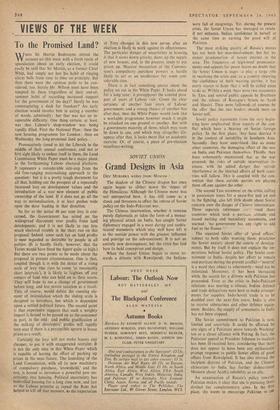VIEWS OF THE WEEK
To the Promised Land?
WHEN Sir Martin Redmayne stirred the autumn air this week with a fresh rustle of
speculation about an early election, it could easily be said that Sir Martin, as a former Chief Whip, had simply not lost his habit of ringing alarm bells from time to time on principle. But then there were the opinion polls to be con- sidered, too. Surely Mr. Wilson must have been tempted by these (regardless of their end-of- summer habit of recording increased support for the government of the day)? Surely he was contemplating a dash for freedom? An early election would involve him in eating a number of words, admittedly: but that was not an in- superable difficulty. One thing certain, at least, was that Labour's shop-window was being rapidly filled. First the National Plan : then the new housing programme for London: then on Wednesday the long-promised land policy.
• Provocatively timed to hit the Liberals in the middle of their annual conference, and not at first sight likely to endear itself to them, the Land Commission White Paper must be a major plank in the forthcoming Labour electoral platform. It represents a considerable side-step from the old free-ranging nationalising approach to the question: but it is a pretty tough document for all that, holding out the prospect of a repeatedly increased levy on development values and the introduction of a vast new element of public ownership of the land. If it does not go all the • way • to nationalisation, it at least pushes wide open the door leading in that direction.
So far as the initial 40 per cent levy is con- cerned, the Government has seized on the widespread discontent over profits from 'land de'velOpment, and it is riot likely to run into much electoral trouble in the short run on this proposal, Indeed, some such tax on land profits ' is• now regarded as desirable by people in all parties: (It is 'hardly likely, however; that' the Tories would have fixed the figure' quite so high.) But there are two points to be made about the proposal in present circumstances. One is that, coupled though it is with the threat of a rising scale of levy (the rises to come 'at reasonably short intervals'), it is likely to frighten off any owners of land who can hold on to their assets. 'They will hope to see a change of government before long, and less-severe taxation as a result. This, of course, would defeat the cunning ele- ment of intimidation which the sliding scale is designed to introduce, but which is dependent upon a settled political future. The second point is that experience suggests that such a weighty impost is bound to be passed on to the consumer in part, in the end: and public gratification at the milking of developers' profits will rapidly turn sour if there is a perceptible upturn in house prices as a result.
Certainly the levy will not make houses any cheaper, to put it with exaggerated restraint. It is not the only idea in this White Paper which is capable of having the effect of pushing up prices in the near future. The launching of the Land Commission, with all its new machinery of compulsory purchase, `crownhold,' and the rest, is bound to introduce a powerful new un- certainty into housing. Political uncertainty has bedevilled housing for a long time now, and just as the Labour promise to repeal the Rent Act helped to kill off that measure, so the expectation of Tory changes in this new set-up after an election is likely to work against its effectiveness. The particular danger of uncertainty in housing, is that it slows down activity, dams up the supply of new houses, and, in the process, tends to put prices up. Massive invocation of the Commis- sion's compulsory purchase powers is hardly likely to act as an accelerator for some con- siderable time.
There is in fact something unreal about the policy set out in the White Paper. It looks ahead for a long time: it presupposes the assured pros- pect of years of Labour rule. Given the clear certainty of another fun- years of Labdur government, and a strong chance of another five after that, then the White Paper would look like a workable programme however much it might be attacked on one ground or another. But with a government majority of three., which may soon he down to one, and which may altogether dis- appear after that, it looks more like an academic exercise. Or, of course, a piece of pre-election manifesto-writing.


































 Previous page
Previous page